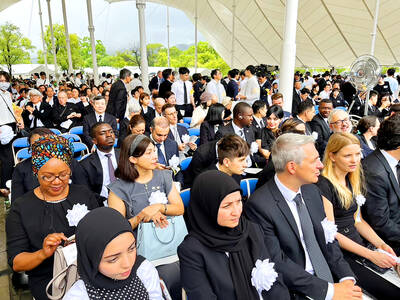The "Varyflush" water-saving device for toilets, the fully ergonomic keyboard, the under water bike and the talking potty are just some of the exhibits on display at the British Invention Show.
But how many will make it into our homes? Not enough, according to some of the world's most eminent inventors. Britain, once the cradle of inventions such as the printing press, the steam engine, electricity and the telephone, has turned its back on product innovation.
That's why inventor and businessman Paul Davidson has set up Facilities Corporate Management (FCM), a business accelerator fund to help inventors commercialize their ideas.
Davidson, who created the Oyster Converter -- a fitting that allows pipes to be joined without welding, soldering or compression -- knows all about the frustrations of an inventor.
"Inventors are treated with total disdain by business in this country, and yet they're some of the richest people in the world," he said in a telephone interview.
Davidson's innovative pipe-fitting was rejected by engineering firm Delta Plc. So he set up his own firm, Oystertec, which was so successful that in October it bought Delta's plumbing unit for ?28 million (US$40 million). But his case is the exception to the rule.
"I've heard estimates that Britain has lost as much as ?165 billion from inventions made here but exploited abroad," said Trevor Bayliss, inventor of the wind-up radio.
The hovercraft, the vertical take-off plane and CAT scanners are just a few British inventions lost to foreign manufacturers.
James Dyson, who invented the bag-less vacuum cleaner, blamed a smorgasbord of economic and cultural reasons for the decline of entrepreneurial spirit in Britain.
High interest rates, a strong pound, and a financial system obsessed by short-term returns have halved the country's manufacturing base since World War II. As most inventions are products that have to be made, this has devastated the market.
Dyson, who spent two fruitless years trying to sell his vacuum cleaners in Europe before being granted a licence in Japan within weeks, said Britain's education system was biased against practical disciplines such as engineering.
"It's a whole way of thinking we have lost," he said.
Sharing these concerns, Bayliss has set up the British Academy of Invention to provide advice, help and a forum for inventors to discuss ideas.
Davidson is also doing his bit for the industry. FCM is sponsored this month's British Invention Show in London. But he also sees a business opportunity.
"The mistake the government makes is to try to turn an inventor into a businessman," he said, referring to various schemes that provide small grants to set up enterprises.

DEFENSE: The first set of three NASAMS that were previously purchased is expected to be delivered by the end of this year and deployed near the capital, sources said Taiwan plans to procure 28 more sets of M-142 High Mobility Artillery Rocket Systems (HIMARS), as well as nine additional sets of National Advanced Surface-to-Air Missile Systems (NASAMS), military sources said yesterday. Taiwan had previously purchased 29 HIMARS launchers from the US and received the first 11 last year. Once the planned purchases are completed and delivered, Taiwan would have 57 sets of HIMARS. The army has also increased the number of MGM-140 Army Tactical Missile Systems (ATACMS) purchased from 64 to 84, the sources added. Each HIMARS launch pod can carry six Guided Multiple Launch Rocket Systems, capable of

TRAJECTORY: The severe tropical storm is predicted to be closest to Taiwan on Wednesday and Thursday, and would influence the nation to varying degrees, a forecaster said The Central Weather Administration (CWA) yesterday said it would likely issue a sea warning for Tropical Storm Podul tomorrow morning and a land warning that evening at the earliest. CWA forecaster Lin Ting-yi (林定宜) said the severe tropical storm is predicted to be closest to Taiwan on Wednesday and Thursday. As of 2pm yesterday, the storm was moving west at 21kph and packing sustained winds of 108kph and gusts of up to 136.8kph, the CWA said. Lin said that the tropical storm was about 1,710km east of Oluanpi (鵝鑾鼻), Taiwan’s southernmost tip, with two possible trajectories over the next one

Tropical Storm Podul strengthened into a typhoon at 8pm yesterday, the Central Weather Administration (CWA) said, with a sea warning to be issued late last night or early this morning. As of 8pm, the typhoon was 1,020km east of Oluanpi (鵝鑾鼻), Taiwan’s southernmost tip, moving west at 23kph. The storm carried maximum sustained winds of 119kph and gusts reaching 155kph, the CWA said. Based on the tropical storm’s trajectory, a land warning could be issued any time from midday today, it added. CWA forecaster Chang Chun-yao (張竣堯) said Podul is a fast-moving storm that is forecast to bring its heaviest rainfall and strongest

CRITICISM: It is deeply regrettable that China, which is pursuing nuclear weapons, has suppressed Taiwan, which is pursuing peace, a government official said Representative to Japan Lee Yi-yang (李逸洋) yesterday accused Beijing of interference after Taiwan’s official delegation to the Nagasaki Peace Memorial Ceremony in Japan was assigned seating in the “international non-governmental organizations [NGO]” area. “Taiwan is by no means an international NGO, but a sovereign nation that is active on the international stage,” Lee said. Lee and Chen Ming-chun (陳銘俊), head of the Taipei Economic and Cultural Office (TECO) in Fukuoka, attended the ceremony in Nagasaki yesterday, which marked the 80th anniversary of the atomic bombing of the city. That followed Lee’s attendance at the Hiroshima Peace Memorial Ceremony on Wednesday